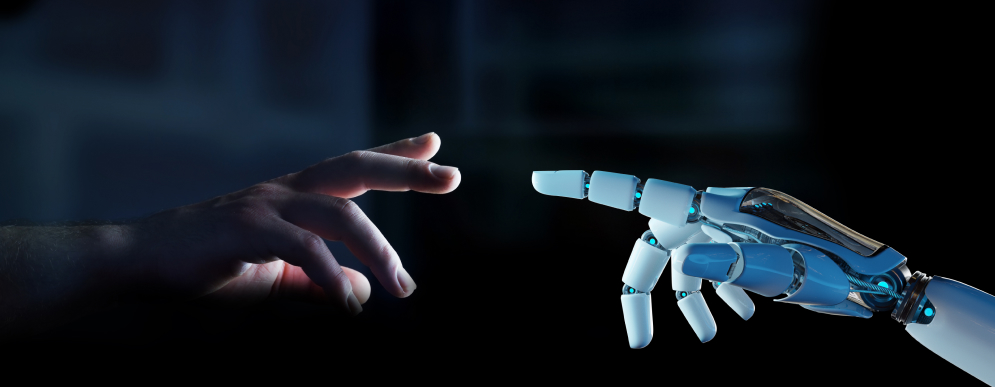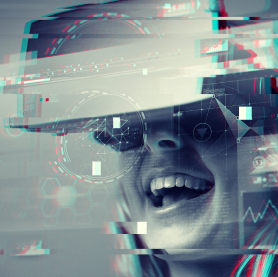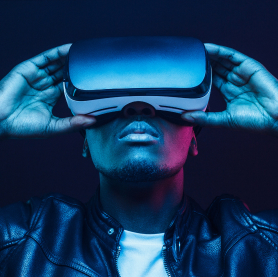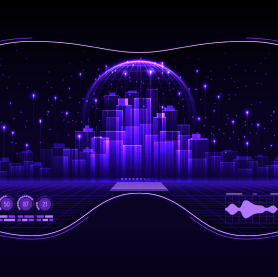A brief introduction into AI
Just those two letters, AI, can conjure up visualizations of some of the wildest technology. What do you picture when you hear them?
Often, AI makes people think of robots—humanoid, curious, and perhaps capable of acts and thoughts. But in reality, what Artificial Intelligence means is expansive: a category of machines and technology that do everything from help recommend Netflix shows as well as drive cars and make art.
AI is already part of our daily lives, even if we don’t know it.
Here, we’ll delve into some contemporary uses of AI, and explain how they prompt fears, a sense of fun, and how many AI systems are already taking their place in the future of technology.

What is AI?
Simply put, Artificial Intelligence refers to systems that are built to mimic human intelligence, especially a capacity for learning from the past in order to come to informed decisions. Yes, some robots are programmed with AI capabilities, but not all of them. Chatbots, facial recognition, self-driving cars, and disease mapping applications do however use AI—and you’ve likely encountered those in your daily life.
Important foundational technologies make up AI, including machine learning (ML), deep learning, and natural language processing (NLP). These are all separate from, but integral to, the concept of AI.
One core component of many AI projects is efficiency: developers use it to streamline tasks that take much more time when handled manually. Talking with thousands of customers, organizing patterns of behavior, and combating common problems in an industry are all reasons to create AI-based solutions.


Why are people scared of AI?
The reality is that we are already living in a world full of AI, and using it in our daily lives. In fact, on the occasions that technology we now expect to be “smart” isn’t (like if the automatic customer service bot doesn’t “understand” your request) we might experience frustration.
So it’s a natural question: why are users skeptical about AI as a concept, as well as downright afraid of a robot takeover?
Fear of the unknown, combined with some media-led misinformation, have stoked concerns around AI. There is a general anxiety about mass unemployment (based on the sense that human labor will be replaced by automation), as well as about the idea of AI falling into ‘the wrong hands.’
Movies like 2001: A Space Odyssey and even Terminator have perpetuated an idea about what happens if the machines become “too smart” and become uncontrollable, forming a SuperIntelligence that humans can no longer compete with.
On one hand, a fear of the unknown is reasonable: we don’t know what will happen in the next decades as far as AI technology goes—but on the other hand, we’ve never known.
What about the Fun?
Fortunately, AI is also a rich field for creative projects, not just automation tools built for data management. There are a multitude of games, art and poetry projects. There are also boundary-breaking tools that allow a user to bring a photograph of a deceased relative “alive” — and some experiments like these have caused an amazing amount of joy to those using them.
Some AI-driven tools like Roombas are anthropomorphized (we give them names and make them characters in memes), while still others are even more specifically built to play off existing desires and emotions, even becoming like their owners.
Further into a realm of what might feel like Sc-Fi, there are many exciting questions about our potential to upload our own minds to a computer, following the hubristic human reach towards immortality.
A Future Full of AI
AI is a topic containing multitudes, and it’s also a bountiful realm of business opportunities and possible solutions for any industry: cybersecurity, healthcare, linguistics—the list goes on.
Almost every field has access to more data than they know what to do with, and AI is a way to analyze massive data sets, train them to predict with astounding accuracy, and present solutions we’ve never dreamed of.
Wondering what the possibilities are for your company? Get in touch with Cloutel and let us architect the future.



